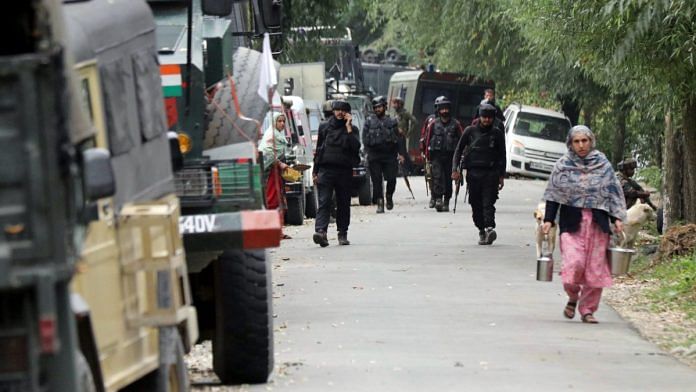New Delhi: Late last week, as Muhammed Riyaz bowed in prayer at the al-Quds mosque in Rawlakote, across the Line of Control in Pakistan-occupied Kashmir, a man dressed in a shirt, trousers and still wearing his motorcycle helmet calmly emptied an automatic weapon into the back of his head. Local police described it as a “blind murder” and promised that the “unknown suspect(s) would soon be traced and brought to justice”.
Though police omitted some significant background from their press release, the Lashkar-e-Taiba soon filled in the blanks: India was taking the war in Kashmir back across the Line of Control.
“Today’s glorious attack in Kokernag,” the Lashkar front organisation The Resistance Front said in a message after the killing of at least three Indian officers in an ambush Wednesday, “is a glorious tribute to shaheed (martyr) Muhammed Riyaz, who was martyred in the Rawlakote area”.
Even as jihadist groups like the Lashkar-e-Taiba and Jaish-e-Mohammed have stepped up offensive operations in Kashmir, using highly-trained cadres who have often successfully eluded the military, some suspect India’s Research and Analysis Wing (R&AW) has been targeting Lashkar operatives across the Line of Control.
The target of the Rawlakote assassination, Riyaz, was the third significant jihad-linked figure killed since February. In February, former Hizb-ul-Mujahideen cadre Bashir Ahmed Peer, also known as Imtiyaz Alam, was shot dead by motorcycle-borne assailants in Rawalpindi. The next week, the former al-Badr operative Syed Khalid Raza was killed in Karachi in what police described as a “targeted attack”.
Although the role of these men in ongoing terrorist operations in Kashmir isn’t clear, intelligence dossiers suggest Riyaz played a key role in facilitating trafficking of personnel and weapons across the mountains into Surankote, and then into the Kashmir valley.
Also Read: New terror tactics — lethal Kokernag ambush illustrates jihadist strategy aimed at tying down troops
The family business
Thirty-eight years old, Jammu and Kashmir Police records suggest, Riyaz grew up in the small village of Salian, nestled in the Bafliaz forests near Surankote, in a clan of buffalo-herding Gujjars from the Kohli clan. Muhammed Azam, his father, was recruited by the Lashkar-e-Taiba in 1997, local residents say, to serve as a guide.
Two years later, in the midst of the Kargil war, the entire family crossed the Line of Control at Jhulass, and relocated to Rawlakote in Pakistan-occupied Kashmir.
Tahir Fazal, the leader of ethnic-Gujjar covert groups who played a key role in decimating the Lashkar from the Surankote belt in 2001-2003, told ThePrint that Azam saw terrorism as “the family business”, rather than an ideological commitment.
“Ever since 1989,” he explained, “jihadist groups would pay Gujjars and Bakkarwals to guide them across the mountain passes, which we know better than anyone else. And the army would also pay for information. The same person would often work for both sides.”
An Indian intelligence official told ThePrint that Riyaz, together with his father and brothers, Muhammed Ismail, and Muhammed Razaq, also began working with the Lashkar after 1999. The period after Kargil saw a severe escalation in violence, as Pakistan sought to compensate for its conventional military defeat by stepping up the jihadist campaign inside Kashmir. For the family, this was an opportunity.
In 2002, Azam was shot dead in a police-led operation near Bafliaz, based on intelligence provided by Fazal’s covert unit. Muhammed Ismail was killed in the same year.
The sexual violence by Lashkar cadre against Gujjar women sparked off a rebellion, which led local residents to annihilate the jihadist presence. Following 2003, moreover, India and Pakistan agreed on a ceasefire on the Line of Control, curtailing jihadist movement and reducing the opportunity for profit.
Even though Riyaz was joined by two other brothers, Muhammed Yakub and Muhammed Ayub, the brothers now subcontracted the dangerous business of border crossing. Their local contacts, however, let them mobilise small-time narcotics dealers and traffickers to help Lashkar.
Assassination campaign
While violence has steadily declined across Kashmir since the Pulwama attack in 2019, there have been a number of lethal attacks on Indian troops over the last two years.
Figures like Riyaz, Indian intelligence officials say, have been critical to helping top Lashkar commanders like Lahore-based Sajid Jatt put together the highly-trained assault teams responsible for these strikes, who have often succeeded in evading Indian counter-terrorism operations with loss. Faced with the challenge, India’s intelligence services are alleged by Pakistan to have staged retaliatory operations against Lashkar commanders in Pakistan, like the assassination of Riyaz.
For instance, a forty-kilogram improvised explosive device exploded near the home of Lashkar chief Hafiz Saeed in June 2021, just ahead of a meeting of the multinational Financial Action Task Force (FATF) to discuss terror-finance sanctions against Pakistan. The bombing exposed the fact that Saeed remained at home despite his conviction in multiple terrorism-financing cases.
The Khalistan Commando Force leader Paramjit Singh Panjwar was also killed in a still-unexplained drive-by shooting at the Sun Flower Housing Society in Lahore’s Johar Town — not far from Hafiz Saeed’s home — earlier this year.
Ejaz Ahmad Ahanger, alleged to have led an Islamic State cell responsible for a series of suicide attacks by Indian nationals in Kabul and Jalalabad, was reported by his family to have been murdered under mysterious circumstances in southern Afghanistan.
The covert killings, two former intelligence officials told ThePrint, provide India some options to target jihadists, short of high risk — and sometimes low-yield — conventional operations like the cross-Line of Control strikes conducted by the Indian Army in 2016.
(Edited by Amrtansh Arora)
Also Read: Jihadist hate can thrive in prison. The story of a cook, a guitarist & a Sufi shows how



